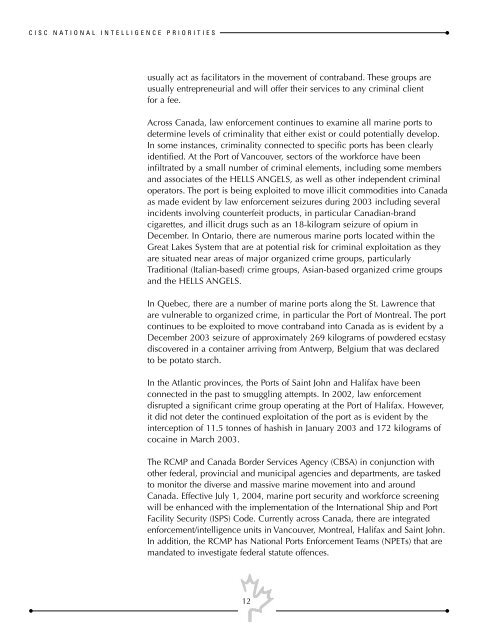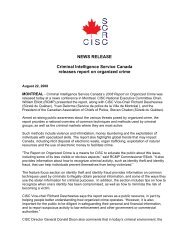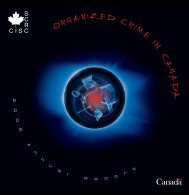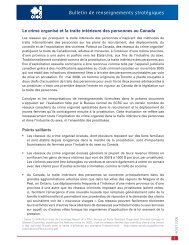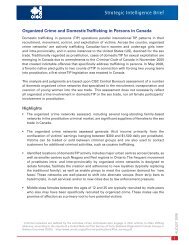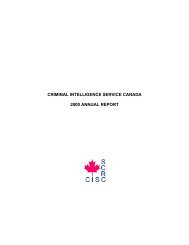2004 Annual Report
2004 Annual Report
2004 Annual Report
You also want an ePaper? Increase the reach of your titles
YUMPU automatically turns print PDFs into web optimized ePapers that Google loves.
CISC NATIONAL INTELLIGENCE PRIORITIES<br />
usually act as facilitators in the movement of contraband. These groups are<br />
usually entrepreneurial and will offer their services to any criminal client<br />
for a fee.<br />
Across Canada, law enforcement continues to examine all marine ports to<br />
determine levels of criminality that either exist or could potentially develop.<br />
In some instances, criminality connected to specific ports has been clearly<br />
identified. At the Port of Vancouver, sectors of the workforce have been<br />
infiltrated by a small number of criminal elements, including some members<br />
and associates of the HELLS ANGELS, as well as other independent criminal<br />
operators. The port is being exploited to move illicit commodities into Canada<br />
as made evident by law enforcement seizures during 2003 including several<br />
incidents involving counterfeit products, in particular Canadian-brand<br />
cigarettes, and illicit drugs such as an 18-kilogram seizure of opium in<br />
December. In Ontario, there are numerous marine ports located within the<br />
Great Lakes System that are at potential risk for criminal exploitation as they<br />
are situated near areas of major organized crime groups, particularly<br />
Traditional (Italian-based) crime groups, Asian-based organized crime groups<br />
and the HELLS ANGELS.<br />
In Quebec, there are a number of marine ports along the St. Lawrence that<br />
are vulnerable to organized crime, in particular the Port of Montreal. The port<br />
continues to be exploited to move contraband into Canada as is evident by a<br />
December 2003 seizure of approximately 269 kilograms of powdered ecstasy<br />
discovered in a container arriving from Antwerp, Belgium that was declared<br />
to be potato starch.<br />
In the Atlantic provinces, the Ports of Saint John and Halifax have been<br />
connected in the past to smuggling attempts. In 2002, law enforcement<br />
disrupted a significant crime group operating at the Port of Halifax. However,<br />
it did not deter the continued exploitation of the port as is evident by the<br />
interception of 11.5 tonnes of hashish in January 2003 and 172 kilograms of<br />
cocaine in March 2003.<br />
The RCMP and Canada Border Services Agency (CBSA) in conjunction with<br />
other federal, provincial and municipal agencies and departments, are tasked<br />
to monitor the diverse and massive marine movement into and around<br />
Canada. Effective July 1, <strong>2004</strong>, marine port security and workforce screening<br />
will be enhanced with the implementation of the International Ship and Port<br />
Facility Security (ISPS) Code. Currently across Canada, there are integrated<br />
enforcement/intelligence units in Vancouver, Montreal, Halifax and Saint John.<br />
In addition, the RCMP has National Ports Enforcement Teams (NPETs) that are<br />
mandated to investigate federal statute offences.<br />
12


